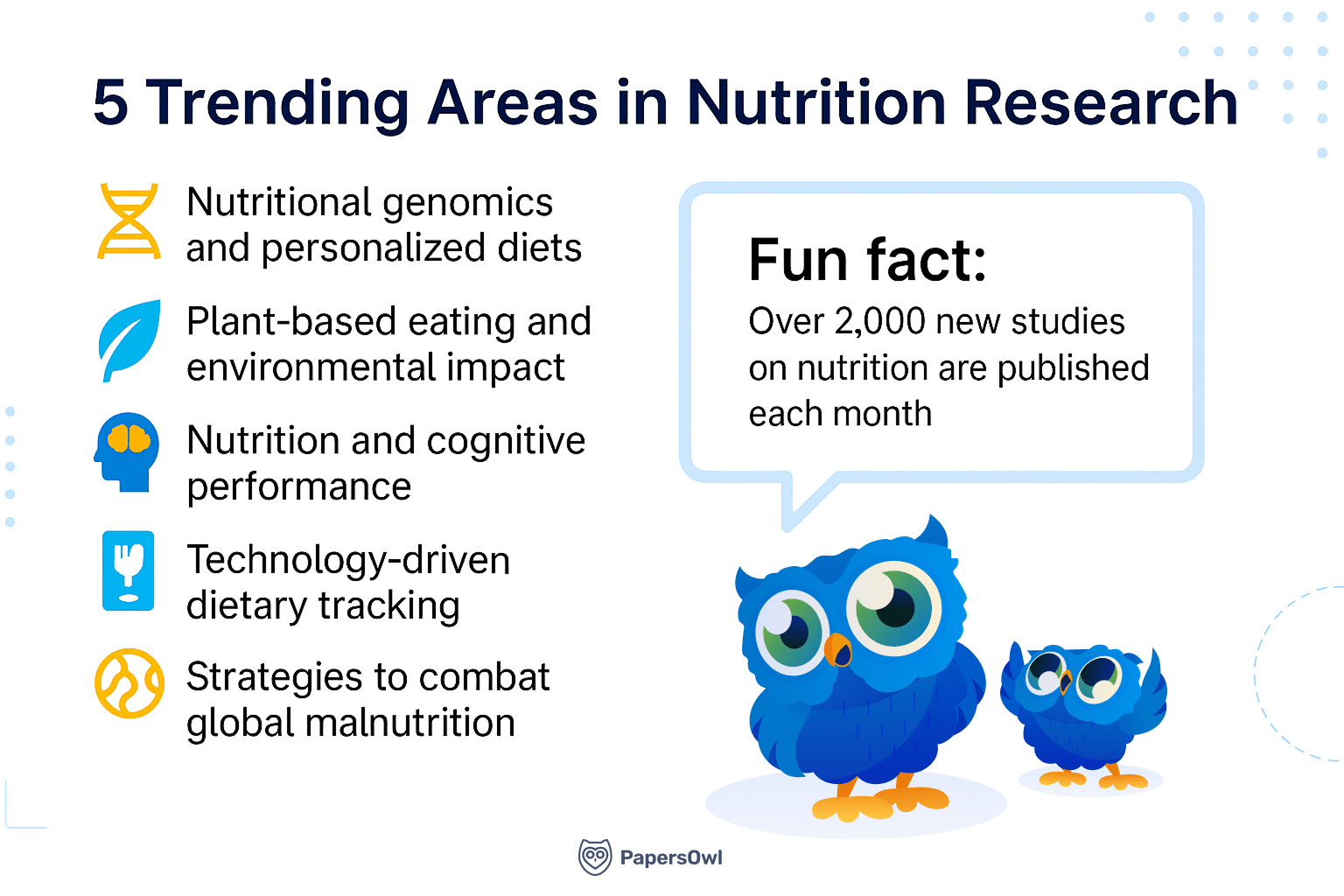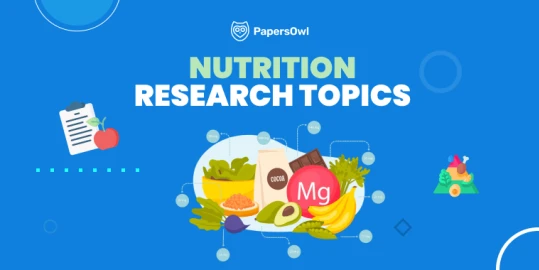The best nutrition research topics for students cover a wide range of ideas. A strong topic guides your research paper. It makes the writing process smoother. It helps connect science with real-world health outcomes.
This article brings together undergraduate and graduate-level directions. It presents clinical and community dietetics and sports food. You will also find practical questions and examples to inspire your study.
Nutrition Research Topics for College Students
College is when many learners explore nutrition topics to research that connect daily life with science. Choosing a good theme helps students build skills.
Undergraduate-Level Topics
Food research topics for nutrition essays inspire students to write clear, focused projects.
- Impact of food delivery apps on diet variety among young adults.
- How food labels shape snack choices in dorm settings.
- The role of meal prepping in building healthy habits for students.
- Effects of caffeine on sleep quality and academic performance.
- Fast-food advertising and its impact on the risk of eating disorders in teenagers.
- Plant-based diets as a low-cost option for college dining halls.
- Nutritional quality of vending machine products on campuses.
- Influence of peer groups on dietary habits in first-year students.
- Role of nutrition education workshops in improving diet quality at universities.
- How campus gardening projects change awareness of food.
Graduate-Level Topics
Selecting interesting nutrition topics for presentation allows students to combine theory with application.
- Dietary interventions for blood sugar management in prediabetic young adults.
- The role of microbiome studies in shaping personalized nutrition plans.
- Community sustenance campaigns targeting childhood obesity prevention.
- The effect of fortified staple foods on community nourishment in low-income areas.
- Evaluating the impact of Mediterranean diet adoption on metabolic health.
- Clinical outcomes of using plant-based meat alternatives in hospital menus.
- Bioethics of genetic data use in nutrigenomics research.
- How food waste reduction programs influence public health nutrition outcomes.
- Digital platforms as tools for dietary interventions in weight management.
- Policy analysis: linking clinical nutrition research with real-world health outcomes.

Interesting Nutrition Topics for Research Paper
Nutrition science topics fit common essays about dietary routine, food labels, or even trendy plans like the ketogenic diet.
Modern Diet Trends and Community Nutrition
These research topics explore how influencer advice affects community eating habits.
- Does the ketogenic diet improve weight loss or just restrict carbs long-term?
- How social media challenges influence teen dietary habits worldwide
- Plant-based eating as a trend versus long-term nourishment science
- Can influencer nutrition advice harm public trust in ingredient labels?
- Detox teas and celebrity diets: a modern risk for eating disorders
- Flexible dieting and macro-counting — efficient or obsessive?
- Intermittent fasting as a lifestyle: health benefits or unstable limits?
- The rise of personalized meal apps: fad or practical science?
- Does social pressure shape healthy eating more than education?
- Food influencers versus licensed dietitians — where do students get real advice?
Dietary Factors in Chronic Lifestyle Diseases
In this part, we focus on health and nutrition research related to chronic diseases. Related lists, such as food research topics for nutrition essays, can also help.
- Exploring blood sugar control and its role in early childhood weight gain and metabolic shifts
- Effects of irregular breakfast routines on glucose stability in young adults
- Investigating fast-food dependence and rising cardiovascular concerns among teenagers
- Can structured, nutrient-rich diets ease initial symptoms of heart disease?
- Sodium intake patterns and their contribution to hypertension and chronic health issues
- Dietary fiber as a protective factor for gut health and chronic disease prevention
- Assessing whether moderate exercise combined with healthy eating lowers chronic metabolic risk
- Comparing high-fructose diets with balanced nutrient plans for disease mitigation
- The link between inconsistent eating habits and early biomarkers of type 2 diabetes
- Evaluating how school nourishment programs influence long-term cardiovascular health
Research Topics in Dietetics
Students today explore how diet affects recovery in hospitals, mental well-being, infant health, and even emergency care protocols. Below are current hot topics in nutrition. They focus on clinical dietetics, followed by themes for population health dietetics.
Clinical Nutrition Research Topics
These research topics focus on direct patient care and treatment-based nutrition. They cover eating disorders, pediatric care, and elderly recovery plans.
- Nutritional therapy for critically ill patients in intensive care units
- Role of maternal nutrition in infant immunity and long-term growth
- Eating disorders in male athletes — early detection using behavior data
- Pediatric nourishment research topics: new feeding plans for premature infants
- Gut microbiome therapy for chronic digestive disorders in adults
- How prebiotic foods improve nutrient absorption during surgery recovery
- Protein metabolism in bedridden elderly patients: risks and interventions
- Tailored hospital diets for patients with chronic liver disease
- Vitamin deficiencies in long-term cardiovascular disease treatment
- Can plant-based hospital meals reduce recovery time in post-operative cases?
Public Health Nutrition and Community Dietetics
This block is ideal for those exploring food and nutrition topics, focusing on large groups, health policy, or education. It combines public health nutrition and strategies for improving public health outcomes. For broader science angles, students can also browse interesting medical research topics.
- Community nutrition outreach for children in low-income neighborhoods
- Promoting health through school lunch reforms and local vegetable sourcing
- Population health nutrition campaigns to reduce sugar beverages in teenagers
- Maternal diet education and how it improves population health results
- Food deserts and obesity: measuring change in urban population health
- Public health results after nationwide salt reduction policies
- Role of community health workers in promoting healthy eating habits
- Using nutrition education for preventing chronic diseases in high-risk populations
- Policy-driven success in reducing childhood anemia through school meals
- Food security and mental health in rural areas — a population health perspective
Sports Nutrition Research Topics
Modern popular nutrition topics include supplements, muscle recovery, and how food affects mental and physical endurance. These ideas are ideal for research papers and wellness studies in college programs.
Performance Enhancement and Dietary Supplements
These research topics explore performance strategies using sports diet, protein formulation, or supplement use. They combine food science with athletic goals.
- Do protein supplements boost athletes’ strength better than whole healthy foods?
- Creatine use in college athletes: long-term benefits or fast burnout?
- Effects of caffeine use on muscle power during short-term sprints
- Sports drinks vs. natural fruit-based hydration for intense physical tasks
- Employee health programs using sports diet to improve focus at work
- Plant-based proteins and their impact on strength gain in endurance athletes
- Vitamin D supplementation for indoor athletes during winter training
- Ergogenic supplements as part of injury rehabilitation nutrition plans
- Nitrate-rich vegetables and increased stamina in cyclists and runners
- Fasted training versus supplemented training — which supports better recovery?
Nutrition for Recovery and Injury Prevention
Healing processes are often linked to nutrition research questions. These research topics focus on digestive function and human health in athletes.
- How probiotics improve gut health and post-game muscle recovery
- Anti-inflammatory diets and their role in long-term injury prevention
- Immune system function in athletes following extreme physical stress
- Glutamine intake and oxidative stress reduction during marathon training
- Omega-3 fatty acids for joint pain recovery in injured athletes
- Hydration plans for sports players in hot climates and heat stroke prevention
- Improving food safety in team cafeterias and its effect on athlete performance
- The role of quality sleep and magnesium-rich foods in injury recovery
- Bone health in female athletes using whole-food calcium sources
- Does personalized nutrition reduce overtraining syndrome and improve human health?
Food Research Topics for Academic Studies
These questions help examine nutritional status, disease links, and how basic food access can shape well-being. They are ideal for exploring real health problems and ways of promoting health through science and daily habits.
- How does iron deficiency affect cognitive development in primary school children?
- Can daily hydration levels serve as a predictor of general nutritional status?
- What role does dietary fat play in hormonal balance during adolescence?
- Do vitamin-rich school lunches reduce common health problems in low-resource areas?
- Relationship between sleep quality and poor nutritional status in university students
- How does dietary fiber intake influence gut microbiota diversity in adults?
- The role of local food traditions in promoting health and preventing malnutrition
- Can a nutrition course improve health literacy among high school students?
- What barriers prevent older adults from maintaining proper nutritional status?
- Nutritional status and academic performance: Is there a direct connection?
Nutritional Responses to the COVID-19 Pandemic
The pandemic triggered massive dietary changes around the world. These are now among the most trending topics in nutrition. They show how global crises influence everyday eating habits and even global security.
- Malnutrition risk and loss of fresh produce access during COVID-19 lockdowns
- Emotional eating and weight changes linked to pandemic-related isolation
- Processed foods as a substitute for home cooking in stressed households
- Role of community gardens in fighting food shortages during crisis periods
- COVID-19 and the shift to home cooking: temporary or lasting dietary change?
- How online grocery delivery affected dietary changes among urban families
- Global food security policies tested by sudden supply chain collapse
- How school closure drove changes in child nutrition and food assistance programs
- Pandemic stress and increased snack consumption among adolescents
- Healthy eating campaigns: can they work during times of food insecurity?

Advances in Food Technology and Biotechnology
These research topics are ideal for students exploring how modern food production is changing global diets, safety, and sustainability. Many of them also fit perfectly for an assignment where an online research paper writer could focus on future foods, climate change, or innovation.
Food Fortification and Nutrient Bioavailability
This part covers how food fortification improves diets. It studies how nutrient levels change during food processing.
- Iron-fortified cereal and its role in reducing childhood anemia
- How food safety protocols affect nutrient bioavailability in fortified meals
- Fortified beverages for elderly nutrition — do they work in daily food intake?
- Food fortification in rural areas and long-term population health benefits
- Bioavailability of vitamins in plant-based fortified foods versus animal products
- The role of food fortification in emergency food production for disaster zones
- Folate-fortified grains as a population health tool in pregnancy nutrition
- How food production methods change micronutrient preservation
- Fortified rice and shelf stability in regions without cold storage
- Omega-3 fortified eggs and improved nutrient retention compared to supplements
Biotechnology in Sustainable Nutrition and Food Safety
These research topics explore engineered crops and sustainable food production. They also cover processed foods and reveal how specific innovations may reduce food waste.
- Can lab-grown meat lower carbon emissions in large-scale food systems?
- Biotechnology in improving shelf life and minimizing industrial food waste
- Engineered grains for better nutrient density in school lunch programs
- Farm innovations that reduce food waste during post-harvest processing
- Society, nutrition, and the role of climate-resilient food systems
- Food processing technology that preserves taste without losing nutrient value
- Microbial proteins as a sustainable substitute for animal protein
- New packaging biotech for sustainable food production and storage
- Using algae-based protein to improve both food safety and global nutrition
- Application of nanotechnology in food science
Emerging Topics in Nutrition and Health
Nutrition is no longer just about calories. It now includes mental balance, genetics, and even gut microbes. These new directions in research connect food with emotion, genetics, and public wellness.
Nutrition and Mental Health Relationships
These research topics link food to mental health and cognitive outcomes. They are ideal for exploring how diet improves mood or immune system function.
- Does dietary fiber improve mental wellness and mood stability in college students?
- Omega-3 intake and reduced depression symptoms across different age groups
- Role of overall nutrition quality in long-term emotional balance and stress management
- Plant-based diets and potential health benefits for anxiety reduction
- Gut-brain axis: how gut health impacts mood and motivation
- Can anti-inflammatory diets lower the risk of cardiovascular disease and depression?
- The effect of probiotic yogurt on cognitive focus during exam season
- High sugar diets and mental burnout in adolescents
- The connection between regular breakfast intake and stable emotional health
- Nutrition education programs and improved mental health awareness among teens
Nutrigenomics and Dietary Interventions
These research topics mix personalized nutrition plans and mindful eating habits. They also examine responses to industrial foods in different bodies. These topics are great for research on precision health.
- DNA-based dietary practices and how they affect weight management outcomes
- Personalized nutrition plans based on gut microbiota for chronic illness prevention
- Mindful eating and its integration with personalized digital meal tracking apps
- Impact of ultra-processed foods on personalized nutrition responses
- Can genetic testing predict better responses to plant-rich diets?
- Tailoring micronutrient intake to improve individual nutritional profile
- Personalized diets vs. generic dietary guidelines: which leads to better outcomes?
- Genetic variation and caffeine metabolism: personalized advice for sleep and focus
- Nutrigenomics in managing food allergies and custom elimination diets
- Microbiome-based supplements as personalized solutions for weight control
Innovations in Food and Dietary Patterns
These research topics explore modern dietary patterns, ethical eating, and bio-based ingredients. Some parallels can even be found in sustainable fashion culture. See how lifestyle research overlaps in fields like sustainable fashion research ideas.
Plant-Based Diets and Alternative Proteins
This section focuses on vegetarian diets and imitation meats. It studies how they connect to gut health, food allergies, and even popular plans like the Mediterranean diet.
- Can plant-based meat alternatives reduce heart disease risk in adolescents?
- Mediterranean nutrition adaptations for students living in dorms
- Food allergies and safety concerns in the rapid shift to vegetarian diets
- Economic accessibility of plant-based proteins in low-income regions
- Gut health response to pea protein vs. soy protein in daily meals
- Environmental impact of vegetarian diets on global food production
- Can vegetarian diets help manage common health problems like PCOS?
- Nutritional limits of fully vegan diets for high-performance athletes
- Role of plant-based proteins in post-workout recovery plans
- Effectiveness of combining plant proteins with seafood in flexible diets
Functional Foods and Superfoods
These research topics explore foods engineered for better health. Like functional foods, fermented foods, and microbiome-friendly options that support digestive health.
- Fermented foods and their long-term effects on digestive health in adults
- Functional foods enriched with antioxidants to prevent early aging
- Can superfoods worsen eating disorders due to nutritional obsession?
- Role of turmeric and other functional spices in inflammation reduction
- How dietary patterns rich in Probiotic foods improve gut health
- Superfood blends and blood pressure in stressed college students
- Marketing of functional foods: health facts vs. consumer hype
- Do chia seeds and flax improve nutrient absorption in plant-based diets?
- Impact of spirulina drinks on healthy metabolism in urban youth
- Nutritional risks of superfood-heavy diets replacing balanced meals
Climate Change and Nutrition Research Topics
Examining publications reveals how dietary changes influence chronic diseases and informs future research directions.
- Analyzing global studies on diet quality and chronic illness prevention.
- Evaluating how food and nutrition journals report on emerging dietary trends.
- Impact of open-access research on public awareness of healthy eating.
- Systematic review of dietary routine in response to pandemics.
- Meta-analysis of nutritional interventions in childhood obesity.
- Tracking the rise of plant-based diets in peer-reviewed publications.
- Evaluating research biases in studies on food allergies.
- How interdisciplinary publications shape nutrition policy.
- Mapping research gaps in rural and indigenous nutrition studies.
- Comparing historical and contemporary nutrition study methodologies.
Other Popular Nutrition Paper Topics
Understanding healthy habits, nutrition patterns, and food quality can guide healthier eating behaviors and improve diet quality across populations.
- Influence of personalized meal planning on maintaining healthy routines.
- Effect of intermittent fasting on overall diet quality and metabolic markers.
- Role of traditional foods in shaping nutrition patterns.
- Comparing nutrition quality between urban and rural populations.
- Assessing the impact of food labeling on consumer choices.
- Innovative strategies to promote healthy eating in schools.
- Evaluating nutrition literacy campaigns and their effectiveness.
- Influence of social media trends on food quality perceptions.
- Investigating links between nutrition patterns and chronic disease prevention.
- Sustainable approaches to improve food quality while reducing waste.
How to Choose a Nutrition Research Topic?
| Guidance & Steps | Example / Notes |
| Focus on relevant areas and choose insightful research topics | Connect nutrition education with food and nutrition practices. Select topics that reveal practical insights or overlooked patterns. |
| Observe local diets and explore nutrient impact | Study how diets in communities adapt over time. Examine the effects of nutrient-rich foods on daily life. |
| Consider small observations and reflect on outcomes | Example: how community gardens influence eating habits. Ensure findings enhance understanding and guide informed decisions. |
Summing Up
Writing a research paper in nutrition is more than collecting data. It is a way of promoting health and influencing real-life eating behaviors. Indeed, thoughtful research encourages better dietary decisions. It also strengthens knowledge of food and inspires actionable solutions due to a focus on practical outcomes and evidence. As a result, your studies contribute to healthier communities and a deeper understanding of dietary science.






